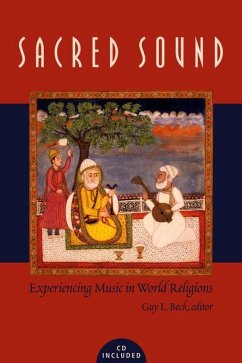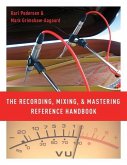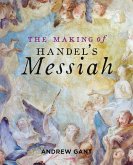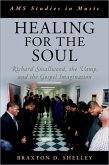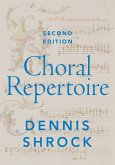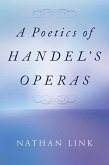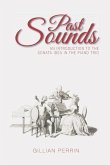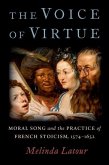Sacred Sound
Experiencing Music in World Religions
Herausgeber: Beck, Guy L
Sacred Sound
Experiencing Music in World Religions
Herausgeber: Beck, Guy L
- Broschiertes Buch
- Merkliste
- Auf die Merkliste
- Bewerten Bewerten
- Teilen
- Produkt teilen
- Produkterinnerung
- Produkterinnerung
Music is one of the most universally recognised forms of human experience. This book acknowledges the critical role of musical activity in religious life. Covering six of the major world religions: Judaism, Christianity, Islam, Hinduism, Sikhism, and Buddhism - it is accompanied by a CD of forty selections of music and chant.
Andere Kunden interessierten sich auch für
![The Recording, Mixing, and Mastering Reference Handbook The Recording, Mixing, and Mastering Reference Handbook]() Karl Pedersen (Lecturer in Recording & Lecturer i Audio TechnologyThe Recording, Mixing, and Mastering Reference Handbook51,99 €
Karl Pedersen (Lecturer in Recording & Lecturer i Audio TechnologyThe Recording, Mixing, and Mastering Reference Handbook51,99 €![The Making of Handel's Messiah The Making of Handel's Messiah]() Andrew GantThe Making of Handel's Messiah19,99 €
Andrew GantThe Making of Handel's Messiah19,99 €![Healing for the Soul Healing for the Soul]() Braxton D. Shelley (Assistant Professor, Department of Music, AssisHealing for the Soul90,99 €
Braxton D. Shelley (Assistant Professor, Department of Music, AssisHealing for the Soul90,99 €![Choral Repertoire Choral Repertoire]() Dennis Shrock (Conductor and Conductor independent scholar and indChoral Repertoire97,99 €
Dennis Shrock (Conductor and Conductor independent scholar and indChoral Repertoire97,99 €![Poetics of Handel's Operas Poetics of Handel's Operas]() Nathan Link (Jr. is H.W. Stodghill and Adele H. Stodghill ProfessoPoetics of Handel's Operas155,99 €
Nathan Link (Jr. is H.W. Stodghill and Adele H. Stodghill ProfessoPoetics of Handel's Operas155,99 €![Past Sounds Past Sounds]() Gillian PerrinPast Sounds29,99 €
Gillian PerrinPast Sounds29,99 €![The Voice of Virtue The Voice of Virtue]() Melinda Latour (Rumsey Family Assistant Professor in the HumanitiesThe Voice of Virtue111,99 €
Melinda Latour (Rumsey Family Assistant Professor in the HumanitiesThe Voice of Virtue111,99 €-
-
-
Music is one of the most universally recognised forms of human experience. This book acknowledges the critical role of musical activity in religious life. Covering six of the major world religions: Judaism, Christianity, Islam, Hinduism, Sikhism, and Buddhism - it is accompanied by a CD of forty selections of music and chant.
Hinweis: Dieser Artikel kann nur an eine deutsche Lieferadresse ausgeliefert werden.
Hinweis: Dieser Artikel kann nur an eine deutsche Lieferadresse ausgeliefert werden.
Produktdetails
- Produktdetails
- Verlag: Wilfrid Laurier University Press
- Seitenzahl: 232
- Erscheinungstermin: 17. Juli 2006
- Englisch
- Abmessung: 228mm x 151mm x 20mm
- Gewicht: 360g
- ISBN-13: 9780889204218
- ISBN-10: 0889204217
- Artikelnr.: 26255403
- Herstellerkennzeichnung
- Libri GmbH
- Europaallee 1
- 36244 Bad Hersfeld
- gpsr@libri.de
- Verlag: Wilfrid Laurier University Press
- Seitenzahl: 232
- Erscheinungstermin: 17. Juli 2006
- Englisch
- Abmessung: 228mm x 151mm x 20mm
- Gewicht: 360g
- ISBN-13: 9780889204218
- ISBN-10: 0889204217
- Artikelnr.: 26255403
- Herstellerkennzeichnung
- Libri GmbH
- Europaallee 1
- 36244 Bad Hersfeld
- gpsr@libri.de
Table of Contents for
Sacred Sound: Experiencing Music in World Religions, edited by Guy L. Beck
Acknowledgments
Introduction Guy L. Beck
Judaism and Music Joseph A. Levine
Christianity and Music Gerald Hobbs
Islam and Music Regula Qureshi
Hinduism and Music Guy L. Beck
Sikhism and Music Pashaura Singh
Buddhism and Music Sean Williams
Glossary
CD Track Listing
Contributors
Discography
Index
CD Track Playlist
Judaism
1. 1st Question of Passover (ex 1) Sung by Joseph A. Levine
2. High Holiday Prayer (ex 4)) Sung by Joseph A. Levine
3. Shema (ex 5)) Sung by Joseph A. Levine
4. Torah (ex 6)) Sung by Joseph A. Levine
5. Passover Haggadah (ex 7)) Sung by Joseph A. Levine
6. Night Prayer (ex 8)) Sung by Joseph A. Levine
7. Priestly Blessing (ex 9)) Sung by Joseph A. Levine
Christianity
8. Kyrie, Sanctus, Agnus Dei (ex 1)) Sung by Richard L. Crocker
9. A Mighty Fortress (ex 2)
10. Salve Regina (ex 3)) Sung by Richard Crocker
11. I'll Praise My Maker (ex 4)) Sung by Gerald Hobbs
12. Holy Holy Holy (ex 5)
13. All Things Bright and Beautiful (ex 6)) Sung by Gerald Hobbs
14. Amazing Grace (ex 7)
Islam
15. Call to Prayer: Adhãn (ex 1)
16. Qur'ãn: Al-Fãtiha (ex 2)) Recited by Hafiz Kani Karaca
17. Ai Nasim e-ku-e (ex 3)) Sung by Regula Qureshi
18. Allãh Allãh Allãhu (ex 4)) Sung by Regula Qureshi
19. Mujrayi Shah (ex 5)) Sung by Regula Qureshi
20. Ai wa-e-nahr-e alquaman (ex 6)) Sung by Regula Qureshi
Hinduism
21. Gãyatri Mantra (ex 1)) Chanted by Guy L. Beck
22. Rig Veda: Purusha Suktam (ex 2)) Chanted by Sri Hariswamy and
Vedaparayanar
23. Bhagavad Gitã 18.65-66 (ex 3)) Chanted by Guy L. Beck
24. Dhrupad: Dekho Sakhi Vrindãbana (ex 4)) Sung by Pandit Bidur Mallik
and Family
25. Padãvali Kirtan: Sri Nanda Nandana (ex 5)) Sung by Guy L. Beck
26. Bhajan of Sur Dãs: Aba Meri Rãkho Lãja Hari (ex 6)) Sung by Guy L.
Beck
27. Raghupati Rãghava (ex 8) Sung by Sonu Nigam
Sikhism
28. Japji Prayer (ex 1)) Chanted by Ragi Bhai Tirlochan Singh Ji
29. Shabad of Guru Arjan: Har Kirtan Sune (ex 2)) Sung by Bhai Nirmal
Singh Ji
30. Shabad of Kabir Har Kã Bilovanã (ex 3)) Sung by Bhai Harjinder Singh
Ji
31. Kaisi Ãrati Hoye (ex 4)) Sung by Bhai Harbans Singh Ji
32. So Dar (ex 5)) Sung by Pashaura Singh
33. Anand (ex 6)) Sung by Pashaura Singh
Buddhism
Drum Invocation
Invocation: Mangalacharanam, Three Gems: Trisaraam (ex 1)) Chanted by
Theravãda monks
Five Precepts: Pañchasila (ex 2)) Chanted by Theravãda monks
Four Noble Truths: Dhamma Chakka Sutta (ex 3)
Tibet Mantra: Om Mani Padme Hum (ex 5)) Chanted by Tibetan monks of the
Drepung Monastery
Tibet Contour Chant (ex 6)) Chanted by Tibetan monks of the Drepung
Monastery
Japanese Heart Sutra: Hannya-Shingyo (ex 7)) Chanted by women of the Jádá
sect in Kyoto, Japan
Contributors' Bios
Guy L. Beck has spent over six years in India studying and researching
Indian music and religion, receiving support from both Fulbright and aiis
(American Institute of Indian Studies) research grants for his work. He
holds an MA in musicology and a PhD in religion from Syracuse University,
as well as degrees in Indian music from institutions in India. His book
Sonic Theology: Hinduism and Sacred Sound (1993) won wide acclaim from
scholars for its presentation of the theoretical dimensions of sacred sound
and music in Hinduism. He also has published numerous articles on various
aspects of Indian religion and music, as well as releasing a CD, Sacred
Raga (1999), which demonstrates his performative expertise in Indian vocal
music. As a result, he has received invitations from many universities,
including Indiana and Princeton, to give lectures and demonstrations. In
2001, he was invited to be a Visiting Fellow by the Oxford Centre for Hindu
Studies at Oxford University (UK), where he taught courses in Hinduism and
music, and received additional support from the Infinity Foundation for
research on the contributions of Indic traditions to world music. He has
taught courses in religious studies and music at Tulane University, in New
Orleans, and is currently teaching at the University of North
Carolina-Wilmington.
Gerald Hobbs is vice-principal of the Vancouver School of Theology. He
holds a BA (Hon.) from the University of Toronto, a BD from Emmanuel
College in Toronto, and a Docteur ès Sciences Religieuses degree from the
Faculté de Théologie Protestante in Strasbourg. His doctoral work focused
on Martin Bucer's German and Latin commentaries on the Psalms, which he is
editing and annotating for a critical edition of Bucer's work. Dr. Hobbs
has also published extensively in Reformation studies, the history of
biblical interpretation (particularly on the Psalms), and the music of the
Christian church. Before going to the Vancouver School of Theology, he
taught at Huntington College in Sudbury and at the Université de Genève. He
served as part-time chaplain with the Canadian Forces in Germany and Italy,
and has also taught in Strasbourg, Paris, and Glasgow as a visiting
professor.
Joseph A. Levine studied fine arts at the Cooper Union, and earned a BA in
religious education at Yeshiva University and a PhD in sacred music at the
Jewish Theological Seminary, where he taught modal chant. He lectures
extensively on the aesthetic dimension of synagogue practice, and his text,
Synagogue Song in America (1989), has been recognized as the most important
study of Jewish music in the past fifty years. His articles have appeared
in The Encyclopedia of Jewish American History and Culture, Gratz College
Centennial, Journal of Synagogue Music, Maryland Jewish Historical Society
Journal, Midstream, Musica Judaica, and the National Jewish Post. He has
also written monographs on the life and times of cantors David Kusevitsky,
Josef Rosenblatt, and Abba Yosef Weisgal. An active cantor himself for
thirty-five years, he is currently a faculty member at the Academy for
Jewish Religion in New York. He serves on the editorial board of the
Cantors Assembly, as well as on the Rabbinical Assembly Committee preparing
a new High Holiday prayer book for the Conservative movement. His recently
published Rise and Be Seated: The Ups and Downs of Jewish Worship (2000)
deals with the ongoing creative process involved in the way Jews have
approached God in prayer since biblical times.
Regula Qureshi is director of the Centre for Ethnomusicology at the
University of Alberta. Her research focuses on music as a social and
discursive process. Aspecialist in South Asian, Islamic, and Canadian
musical practices, she is the author of Sufi Music of India and Pakistan:
Sound, Context, and Meaning in Qawwali (1986), coeditor of Voices of Women:
Essays in Honour of Violet Archer (1995), and a contributor to
Ethnomusicology, Asian Music, the Journal of Musicology, and the Journal of
the American Musicological Society. A cellist and sarangi player, her
current book projects are Hindustani Musicians Speak and Sarangi: Art Music
and Political Economy in North India.
Pashaura Singh is a professor in the Department of Religious Studies at the
University of California, Riverside, where he teaches courses in Sikhism
and religion. His dissertation topic (University of Toronto) was The Text
and Meaning of the Adi Granth, and his more recent research has focused on
the life and teaching of Guru Arjan. He is the author of Guru Granth Sahib:
Canon, Meaning and Authority (2001) and The Bhagats of the Guru Granth
Sahib: Sikh Sel-Definition and the Bhagat Bani (2003). He also performs
Sikh Kirtan and specializes in Gurbani Shabad hymns.
Sean Williams has a BA in music from the University of California at
Berkeley, and an MA and PhD in ethnomusicology from the University of
Washington. Her subject areas include ethnomusicology, Indonesian language
and literature, Celtic languages and literature, and Southeast Asian
studies. She is currently a faculty member at the Evergreen State College
in Olympia, Washington. Her recent book, The Sound of the Ancestral Ship:
Highland Music of West Java (2001) follows her work as co-editor of
Southeast Asia (Garland Encyclopedia of World Music, Vol. 4, 1998). A
recognized authority on Buddhist chant, she gives many lectures and
demonstrations.
Sacred Sound: Experiencing Music in World Religions, edited by Guy L. Beck
Acknowledgments
Introduction Guy L. Beck
Judaism and Music Joseph A. Levine
Christianity and Music Gerald Hobbs
Islam and Music Regula Qureshi
Hinduism and Music Guy L. Beck
Sikhism and Music Pashaura Singh
Buddhism and Music Sean Williams
Glossary
CD Track Listing
Contributors
Discography
Index
CD Track Playlist
Judaism
1. 1st Question of Passover (ex 1) Sung by Joseph A. Levine
2. High Holiday Prayer (ex 4)) Sung by Joseph A. Levine
3. Shema (ex 5)) Sung by Joseph A. Levine
4. Torah (ex 6)) Sung by Joseph A. Levine
5. Passover Haggadah (ex 7)) Sung by Joseph A. Levine
6. Night Prayer (ex 8)) Sung by Joseph A. Levine
7. Priestly Blessing (ex 9)) Sung by Joseph A. Levine
Christianity
8. Kyrie, Sanctus, Agnus Dei (ex 1)) Sung by Richard L. Crocker
9. A Mighty Fortress (ex 2)
10. Salve Regina (ex 3)) Sung by Richard Crocker
11. I'll Praise My Maker (ex 4)) Sung by Gerald Hobbs
12. Holy Holy Holy (ex 5)
13. All Things Bright and Beautiful (ex 6)) Sung by Gerald Hobbs
14. Amazing Grace (ex 7)
Islam
15. Call to Prayer: Adhãn (ex 1)
16. Qur'ãn: Al-Fãtiha (ex 2)) Recited by Hafiz Kani Karaca
17. Ai Nasim e-ku-e (ex 3)) Sung by Regula Qureshi
18. Allãh Allãh Allãhu (ex 4)) Sung by Regula Qureshi
19. Mujrayi Shah (ex 5)) Sung by Regula Qureshi
20. Ai wa-e-nahr-e alquaman (ex 6)) Sung by Regula Qureshi
Hinduism
21. Gãyatri Mantra (ex 1)) Chanted by Guy L. Beck
22. Rig Veda: Purusha Suktam (ex 2)) Chanted by Sri Hariswamy and
Vedaparayanar
23. Bhagavad Gitã 18.65-66 (ex 3)) Chanted by Guy L. Beck
24. Dhrupad: Dekho Sakhi Vrindãbana (ex 4)) Sung by Pandit Bidur Mallik
and Family
25. Padãvali Kirtan: Sri Nanda Nandana (ex 5)) Sung by Guy L. Beck
26. Bhajan of Sur Dãs: Aba Meri Rãkho Lãja Hari (ex 6)) Sung by Guy L.
Beck
27. Raghupati Rãghava (ex 8) Sung by Sonu Nigam
Sikhism
28. Japji Prayer (ex 1)) Chanted by Ragi Bhai Tirlochan Singh Ji
29. Shabad of Guru Arjan: Har Kirtan Sune (ex 2)) Sung by Bhai Nirmal
Singh Ji
30. Shabad of Kabir Har Kã Bilovanã (ex 3)) Sung by Bhai Harjinder Singh
Ji
31. Kaisi Ãrati Hoye (ex 4)) Sung by Bhai Harbans Singh Ji
32. So Dar (ex 5)) Sung by Pashaura Singh
33. Anand (ex 6)) Sung by Pashaura Singh
Buddhism
Drum Invocation
Invocation: Mangalacharanam, Three Gems: Trisaraam (ex 1)) Chanted by
Theravãda monks
Five Precepts: Pañchasila (ex 2)) Chanted by Theravãda monks
Four Noble Truths: Dhamma Chakka Sutta (ex 3)
Tibet Mantra: Om Mani Padme Hum (ex 5)) Chanted by Tibetan monks of the
Drepung Monastery
Tibet Contour Chant (ex 6)) Chanted by Tibetan monks of the Drepung
Monastery
Japanese Heart Sutra: Hannya-Shingyo (ex 7)) Chanted by women of the Jádá
sect in Kyoto, Japan
Contributors' Bios
Guy L. Beck has spent over six years in India studying and researching
Indian music and religion, receiving support from both Fulbright and aiis
(American Institute of Indian Studies) research grants for his work. He
holds an MA in musicology and a PhD in religion from Syracuse University,
as well as degrees in Indian music from institutions in India. His book
Sonic Theology: Hinduism and Sacred Sound (1993) won wide acclaim from
scholars for its presentation of the theoretical dimensions of sacred sound
and music in Hinduism. He also has published numerous articles on various
aspects of Indian religion and music, as well as releasing a CD, Sacred
Raga (1999), which demonstrates his performative expertise in Indian vocal
music. As a result, he has received invitations from many universities,
including Indiana and Princeton, to give lectures and demonstrations. In
2001, he was invited to be a Visiting Fellow by the Oxford Centre for Hindu
Studies at Oxford University (UK), where he taught courses in Hinduism and
music, and received additional support from the Infinity Foundation for
research on the contributions of Indic traditions to world music. He has
taught courses in religious studies and music at Tulane University, in New
Orleans, and is currently teaching at the University of North
Carolina-Wilmington.
Gerald Hobbs is vice-principal of the Vancouver School of Theology. He
holds a BA (Hon.) from the University of Toronto, a BD from Emmanuel
College in Toronto, and a Docteur ès Sciences Religieuses degree from the
Faculté de Théologie Protestante in Strasbourg. His doctoral work focused
on Martin Bucer's German and Latin commentaries on the Psalms, which he is
editing and annotating for a critical edition of Bucer's work. Dr. Hobbs
has also published extensively in Reformation studies, the history of
biblical interpretation (particularly on the Psalms), and the music of the
Christian church. Before going to the Vancouver School of Theology, he
taught at Huntington College in Sudbury and at the Université de Genève. He
served as part-time chaplain with the Canadian Forces in Germany and Italy,
and has also taught in Strasbourg, Paris, and Glasgow as a visiting
professor.
Joseph A. Levine studied fine arts at the Cooper Union, and earned a BA in
religious education at Yeshiva University and a PhD in sacred music at the
Jewish Theological Seminary, where he taught modal chant. He lectures
extensively on the aesthetic dimension of synagogue practice, and his text,
Synagogue Song in America (1989), has been recognized as the most important
study of Jewish music in the past fifty years. His articles have appeared
in The Encyclopedia of Jewish American History and Culture, Gratz College
Centennial, Journal of Synagogue Music, Maryland Jewish Historical Society
Journal, Midstream, Musica Judaica, and the National Jewish Post. He has
also written monographs on the life and times of cantors David Kusevitsky,
Josef Rosenblatt, and Abba Yosef Weisgal. An active cantor himself for
thirty-five years, he is currently a faculty member at the Academy for
Jewish Religion in New York. He serves on the editorial board of the
Cantors Assembly, as well as on the Rabbinical Assembly Committee preparing
a new High Holiday prayer book for the Conservative movement. His recently
published Rise and Be Seated: The Ups and Downs of Jewish Worship (2000)
deals with the ongoing creative process involved in the way Jews have
approached God in prayer since biblical times.
Regula Qureshi is director of the Centre for Ethnomusicology at the
University of Alberta. Her research focuses on music as a social and
discursive process. Aspecialist in South Asian, Islamic, and Canadian
musical practices, she is the author of Sufi Music of India and Pakistan:
Sound, Context, and Meaning in Qawwali (1986), coeditor of Voices of Women:
Essays in Honour of Violet Archer (1995), and a contributor to
Ethnomusicology, Asian Music, the Journal of Musicology, and the Journal of
the American Musicological Society. A cellist and sarangi player, her
current book projects are Hindustani Musicians Speak and Sarangi: Art Music
and Political Economy in North India.
Pashaura Singh is a professor in the Department of Religious Studies at the
University of California, Riverside, where he teaches courses in Sikhism
and religion. His dissertation topic (University of Toronto) was The Text
and Meaning of the Adi Granth, and his more recent research has focused on
the life and teaching of Guru Arjan. He is the author of Guru Granth Sahib:
Canon, Meaning and Authority (2001) and The Bhagats of the Guru Granth
Sahib: Sikh Sel-Definition and the Bhagat Bani (2003). He also performs
Sikh Kirtan and specializes in Gurbani Shabad hymns.
Sean Williams has a BA in music from the University of California at
Berkeley, and an MA and PhD in ethnomusicology from the University of
Washington. Her subject areas include ethnomusicology, Indonesian language
and literature, Celtic languages and literature, and Southeast Asian
studies. She is currently a faculty member at the Evergreen State College
in Olympia, Washington. Her recent book, The Sound of the Ancestral Ship:
Highland Music of West Java (2001) follows her work as co-editor of
Southeast Asia (Garland Encyclopedia of World Music, Vol. 4, 1998). A
recognized authority on Buddhist chant, she gives many lectures and
demonstrations.
Table of Contents for
Sacred Sound: Experiencing Music in World Religions, edited by Guy L. Beck
Acknowledgments
Introduction Guy L. Beck
Judaism and Music Joseph A. Levine
Christianity and Music Gerald Hobbs
Islam and Music Regula Qureshi
Hinduism and Music Guy L. Beck
Sikhism and Music Pashaura Singh
Buddhism and Music Sean Williams
Glossary
CD Track Listing
Contributors
Discography
Index
CD Track Playlist
Judaism
1. 1st Question of Passover (ex 1) Sung by Joseph A. Levine
2. High Holiday Prayer (ex 4)) Sung by Joseph A. Levine
3. Shema (ex 5)) Sung by Joseph A. Levine
4. Torah (ex 6)) Sung by Joseph A. Levine
5. Passover Haggadah (ex 7)) Sung by Joseph A. Levine
6. Night Prayer (ex 8)) Sung by Joseph A. Levine
7. Priestly Blessing (ex 9)) Sung by Joseph A. Levine
Christianity
8. Kyrie, Sanctus, Agnus Dei (ex 1)) Sung by Richard L. Crocker
9. A Mighty Fortress (ex 2)
10. Salve Regina (ex 3)) Sung by Richard Crocker
11. I'll Praise My Maker (ex 4)) Sung by Gerald Hobbs
12. Holy Holy Holy (ex 5)
13. All Things Bright and Beautiful (ex 6)) Sung by Gerald Hobbs
14. Amazing Grace (ex 7)
Islam
15. Call to Prayer: Adhãn (ex 1)
16. Qur'ãn: Al-Fãtiha (ex 2)) Recited by Hafiz Kani Karaca
17. Ai Nasim e-ku-e (ex 3)) Sung by Regula Qureshi
18. Allãh Allãh Allãhu (ex 4)) Sung by Regula Qureshi
19. Mujrayi Shah (ex 5)) Sung by Regula Qureshi
20. Ai wa-e-nahr-e alquaman (ex 6)) Sung by Regula Qureshi
Hinduism
21. Gãyatri Mantra (ex 1)) Chanted by Guy L. Beck
22. Rig Veda: Purusha Suktam (ex 2)) Chanted by Sri Hariswamy and
Vedaparayanar
23. Bhagavad Gitã 18.65-66 (ex 3)) Chanted by Guy L. Beck
24. Dhrupad: Dekho Sakhi Vrindãbana (ex 4)) Sung by Pandit Bidur Mallik
and Family
25. Padãvali Kirtan: Sri Nanda Nandana (ex 5)) Sung by Guy L. Beck
26. Bhajan of Sur Dãs: Aba Meri Rãkho Lãja Hari (ex 6)) Sung by Guy L.
Beck
27. Raghupati Rãghava (ex 8) Sung by Sonu Nigam
Sikhism
28. Japji Prayer (ex 1)) Chanted by Ragi Bhai Tirlochan Singh Ji
29. Shabad of Guru Arjan: Har Kirtan Sune (ex 2)) Sung by Bhai Nirmal
Singh Ji
30. Shabad of Kabir Har Kã Bilovanã (ex 3)) Sung by Bhai Harjinder Singh
Ji
31. Kaisi Ãrati Hoye (ex 4)) Sung by Bhai Harbans Singh Ji
32. So Dar (ex 5)) Sung by Pashaura Singh
33. Anand (ex 6)) Sung by Pashaura Singh
Buddhism
Drum Invocation
Invocation: Mangalacharanam, Three Gems: Trisaraam (ex 1)) Chanted by
Theravãda monks
Five Precepts: Pañchasila (ex 2)) Chanted by Theravãda monks
Four Noble Truths: Dhamma Chakka Sutta (ex 3)
Tibet Mantra: Om Mani Padme Hum (ex 5)) Chanted by Tibetan monks of the
Drepung Monastery
Tibet Contour Chant (ex 6)) Chanted by Tibetan monks of the Drepung
Monastery
Japanese Heart Sutra: Hannya-Shingyo (ex 7)) Chanted by women of the Jádá
sect in Kyoto, Japan
Contributors' Bios
Guy L. Beck has spent over six years in India studying and researching
Indian music and religion, receiving support from both Fulbright and aiis
(American Institute of Indian Studies) research grants for his work. He
holds an MA in musicology and a PhD in religion from Syracuse University,
as well as degrees in Indian music from institutions in India. His book
Sonic Theology: Hinduism and Sacred Sound (1993) won wide acclaim from
scholars for its presentation of the theoretical dimensions of sacred sound
and music in Hinduism. He also has published numerous articles on various
aspects of Indian religion and music, as well as releasing a CD, Sacred
Raga (1999), which demonstrates his performative expertise in Indian vocal
music. As a result, he has received invitations from many universities,
including Indiana and Princeton, to give lectures and demonstrations. In
2001, he was invited to be a Visiting Fellow by the Oxford Centre for Hindu
Studies at Oxford University (UK), where he taught courses in Hinduism and
music, and received additional support from the Infinity Foundation for
research on the contributions of Indic traditions to world music. He has
taught courses in religious studies and music at Tulane University, in New
Orleans, and is currently teaching at the University of North
Carolina-Wilmington.
Gerald Hobbs is vice-principal of the Vancouver School of Theology. He
holds a BA (Hon.) from the University of Toronto, a BD from Emmanuel
College in Toronto, and a Docteur ès Sciences Religieuses degree from the
Faculté de Théologie Protestante in Strasbourg. His doctoral work focused
on Martin Bucer's German and Latin commentaries on the Psalms, which he is
editing and annotating for a critical edition of Bucer's work. Dr. Hobbs
has also published extensively in Reformation studies, the history of
biblical interpretation (particularly on the Psalms), and the music of the
Christian church. Before going to the Vancouver School of Theology, he
taught at Huntington College in Sudbury and at the Université de Genève. He
served as part-time chaplain with the Canadian Forces in Germany and Italy,
and has also taught in Strasbourg, Paris, and Glasgow as a visiting
professor.
Joseph A. Levine studied fine arts at the Cooper Union, and earned a BA in
religious education at Yeshiva University and a PhD in sacred music at the
Jewish Theological Seminary, where he taught modal chant. He lectures
extensively on the aesthetic dimension of synagogue practice, and his text,
Synagogue Song in America (1989), has been recognized as the most important
study of Jewish music in the past fifty years. His articles have appeared
in The Encyclopedia of Jewish American History and Culture, Gratz College
Centennial, Journal of Synagogue Music, Maryland Jewish Historical Society
Journal, Midstream, Musica Judaica, and the National Jewish Post. He has
also written monographs on the life and times of cantors David Kusevitsky,
Josef Rosenblatt, and Abba Yosef Weisgal. An active cantor himself for
thirty-five years, he is currently a faculty member at the Academy for
Jewish Religion in New York. He serves on the editorial board of the
Cantors Assembly, as well as on the Rabbinical Assembly Committee preparing
a new High Holiday prayer book for the Conservative movement. His recently
published Rise and Be Seated: The Ups and Downs of Jewish Worship (2000)
deals with the ongoing creative process involved in the way Jews have
approached God in prayer since biblical times.
Regula Qureshi is director of the Centre for Ethnomusicology at the
University of Alberta. Her research focuses on music as a social and
discursive process. Aspecialist in South Asian, Islamic, and Canadian
musical practices, she is the author of Sufi Music of India and Pakistan:
Sound, Context, and Meaning in Qawwali (1986), coeditor of Voices of Women:
Essays in Honour of Violet Archer (1995), and a contributor to
Ethnomusicology, Asian Music, the Journal of Musicology, and the Journal of
the American Musicological Society. A cellist and sarangi player, her
current book projects are Hindustani Musicians Speak and Sarangi: Art Music
and Political Economy in North India.
Pashaura Singh is a professor in the Department of Religious Studies at the
University of California, Riverside, where he teaches courses in Sikhism
and religion. His dissertation topic (University of Toronto) was The Text
and Meaning of the Adi Granth, and his more recent research has focused on
the life and teaching of Guru Arjan. He is the author of Guru Granth Sahib:
Canon, Meaning and Authority (2001) and The Bhagats of the Guru Granth
Sahib: Sikh Sel-Definition and the Bhagat Bani (2003). He also performs
Sikh Kirtan and specializes in Gurbani Shabad hymns.
Sean Williams has a BA in music from the University of California at
Berkeley, and an MA and PhD in ethnomusicology from the University of
Washington. Her subject areas include ethnomusicology, Indonesian language
and literature, Celtic languages and literature, and Southeast Asian
studies. She is currently a faculty member at the Evergreen State College
in Olympia, Washington. Her recent book, The Sound of the Ancestral Ship:
Highland Music of West Java (2001) follows her work as co-editor of
Southeast Asia (Garland Encyclopedia of World Music, Vol. 4, 1998). A
recognized authority on Buddhist chant, she gives many lectures and
demonstrations.
Sacred Sound: Experiencing Music in World Religions, edited by Guy L. Beck
Acknowledgments
Introduction Guy L. Beck
Judaism and Music Joseph A. Levine
Christianity and Music Gerald Hobbs
Islam and Music Regula Qureshi
Hinduism and Music Guy L. Beck
Sikhism and Music Pashaura Singh
Buddhism and Music Sean Williams
Glossary
CD Track Listing
Contributors
Discography
Index
CD Track Playlist
Judaism
1. 1st Question of Passover (ex 1) Sung by Joseph A. Levine
2. High Holiday Prayer (ex 4)) Sung by Joseph A. Levine
3. Shema (ex 5)) Sung by Joseph A. Levine
4. Torah (ex 6)) Sung by Joseph A. Levine
5. Passover Haggadah (ex 7)) Sung by Joseph A. Levine
6. Night Prayer (ex 8)) Sung by Joseph A. Levine
7. Priestly Blessing (ex 9)) Sung by Joseph A. Levine
Christianity
8. Kyrie, Sanctus, Agnus Dei (ex 1)) Sung by Richard L. Crocker
9. A Mighty Fortress (ex 2)
10. Salve Regina (ex 3)) Sung by Richard Crocker
11. I'll Praise My Maker (ex 4)) Sung by Gerald Hobbs
12. Holy Holy Holy (ex 5)
13. All Things Bright and Beautiful (ex 6)) Sung by Gerald Hobbs
14. Amazing Grace (ex 7)
Islam
15. Call to Prayer: Adhãn (ex 1)
16. Qur'ãn: Al-Fãtiha (ex 2)) Recited by Hafiz Kani Karaca
17. Ai Nasim e-ku-e (ex 3)) Sung by Regula Qureshi
18. Allãh Allãh Allãhu (ex 4)) Sung by Regula Qureshi
19. Mujrayi Shah (ex 5)) Sung by Regula Qureshi
20. Ai wa-e-nahr-e alquaman (ex 6)) Sung by Regula Qureshi
Hinduism
21. Gãyatri Mantra (ex 1)) Chanted by Guy L. Beck
22. Rig Veda: Purusha Suktam (ex 2)) Chanted by Sri Hariswamy and
Vedaparayanar
23. Bhagavad Gitã 18.65-66 (ex 3)) Chanted by Guy L. Beck
24. Dhrupad: Dekho Sakhi Vrindãbana (ex 4)) Sung by Pandit Bidur Mallik
and Family
25. Padãvali Kirtan: Sri Nanda Nandana (ex 5)) Sung by Guy L. Beck
26. Bhajan of Sur Dãs: Aba Meri Rãkho Lãja Hari (ex 6)) Sung by Guy L.
Beck
27. Raghupati Rãghava (ex 8) Sung by Sonu Nigam
Sikhism
28. Japji Prayer (ex 1)) Chanted by Ragi Bhai Tirlochan Singh Ji
29. Shabad of Guru Arjan: Har Kirtan Sune (ex 2)) Sung by Bhai Nirmal
Singh Ji
30. Shabad of Kabir Har Kã Bilovanã (ex 3)) Sung by Bhai Harjinder Singh
Ji
31. Kaisi Ãrati Hoye (ex 4)) Sung by Bhai Harbans Singh Ji
32. So Dar (ex 5)) Sung by Pashaura Singh
33. Anand (ex 6)) Sung by Pashaura Singh
Buddhism
Drum Invocation
Invocation: Mangalacharanam, Three Gems: Trisaraam (ex 1)) Chanted by
Theravãda monks
Five Precepts: Pañchasila (ex 2)) Chanted by Theravãda monks
Four Noble Truths: Dhamma Chakka Sutta (ex 3)
Tibet Mantra: Om Mani Padme Hum (ex 5)) Chanted by Tibetan monks of the
Drepung Monastery
Tibet Contour Chant (ex 6)) Chanted by Tibetan monks of the Drepung
Monastery
Japanese Heart Sutra: Hannya-Shingyo (ex 7)) Chanted by women of the Jádá
sect in Kyoto, Japan
Contributors' Bios
Guy L. Beck has spent over six years in India studying and researching
Indian music and religion, receiving support from both Fulbright and aiis
(American Institute of Indian Studies) research grants for his work. He
holds an MA in musicology and a PhD in religion from Syracuse University,
as well as degrees in Indian music from institutions in India. His book
Sonic Theology: Hinduism and Sacred Sound (1993) won wide acclaim from
scholars for its presentation of the theoretical dimensions of sacred sound
and music in Hinduism. He also has published numerous articles on various
aspects of Indian religion and music, as well as releasing a CD, Sacred
Raga (1999), which demonstrates his performative expertise in Indian vocal
music. As a result, he has received invitations from many universities,
including Indiana and Princeton, to give lectures and demonstrations. In
2001, he was invited to be a Visiting Fellow by the Oxford Centre for Hindu
Studies at Oxford University (UK), where he taught courses in Hinduism and
music, and received additional support from the Infinity Foundation for
research on the contributions of Indic traditions to world music. He has
taught courses in religious studies and music at Tulane University, in New
Orleans, and is currently teaching at the University of North
Carolina-Wilmington.
Gerald Hobbs is vice-principal of the Vancouver School of Theology. He
holds a BA (Hon.) from the University of Toronto, a BD from Emmanuel
College in Toronto, and a Docteur ès Sciences Religieuses degree from the
Faculté de Théologie Protestante in Strasbourg. His doctoral work focused
on Martin Bucer's German and Latin commentaries on the Psalms, which he is
editing and annotating for a critical edition of Bucer's work. Dr. Hobbs
has also published extensively in Reformation studies, the history of
biblical interpretation (particularly on the Psalms), and the music of the
Christian church. Before going to the Vancouver School of Theology, he
taught at Huntington College in Sudbury and at the Université de Genève. He
served as part-time chaplain with the Canadian Forces in Germany and Italy,
and has also taught in Strasbourg, Paris, and Glasgow as a visiting
professor.
Joseph A. Levine studied fine arts at the Cooper Union, and earned a BA in
religious education at Yeshiva University and a PhD in sacred music at the
Jewish Theological Seminary, where he taught modal chant. He lectures
extensively on the aesthetic dimension of synagogue practice, and his text,
Synagogue Song in America (1989), has been recognized as the most important
study of Jewish music in the past fifty years. His articles have appeared
in The Encyclopedia of Jewish American History and Culture, Gratz College
Centennial, Journal of Synagogue Music, Maryland Jewish Historical Society
Journal, Midstream, Musica Judaica, and the National Jewish Post. He has
also written monographs on the life and times of cantors David Kusevitsky,
Josef Rosenblatt, and Abba Yosef Weisgal. An active cantor himself for
thirty-five years, he is currently a faculty member at the Academy for
Jewish Religion in New York. He serves on the editorial board of the
Cantors Assembly, as well as on the Rabbinical Assembly Committee preparing
a new High Holiday prayer book for the Conservative movement. His recently
published Rise and Be Seated: The Ups and Downs of Jewish Worship (2000)
deals with the ongoing creative process involved in the way Jews have
approached God in prayer since biblical times.
Regula Qureshi is director of the Centre for Ethnomusicology at the
University of Alberta. Her research focuses on music as a social and
discursive process. Aspecialist in South Asian, Islamic, and Canadian
musical practices, she is the author of Sufi Music of India and Pakistan:
Sound, Context, and Meaning in Qawwali (1986), coeditor of Voices of Women:
Essays in Honour of Violet Archer (1995), and a contributor to
Ethnomusicology, Asian Music, the Journal of Musicology, and the Journal of
the American Musicological Society. A cellist and sarangi player, her
current book projects are Hindustani Musicians Speak and Sarangi: Art Music
and Political Economy in North India.
Pashaura Singh is a professor in the Department of Religious Studies at the
University of California, Riverside, where he teaches courses in Sikhism
and religion. His dissertation topic (University of Toronto) was The Text
and Meaning of the Adi Granth, and his more recent research has focused on
the life and teaching of Guru Arjan. He is the author of Guru Granth Sahib:
Canon, Meaning and Authority (2001) and The Bhagats of the Guru Granth
Sahib: Sikh Sel-Definition and the Bhagat Bani (2003). He also performs
Sikh Kirtan and specializes in Gurbani Shabad hymns.
Sean Williams has a BA in music from the University of California at
Berkeley, and an MA and PhD in ethnomusicology from the University of
Washington. Her subject areas include ethnomusicology, Indonesian language
and literature, Celtic languages and literature, and Southeast Asian
studies. She is currently a faculty member at the Evergreen State College
in Olympia, Washington. Her recent book, The Sound of the Ancestral Ship:
Highland Music of West Java (2001) follows her work as co-editor of
Southeast Asia (Garland Encyclopedia of World Music, Vol. 4, 1998). A
recognized authority on Buddhist chant, she gives many lectures and
demonstrations.

